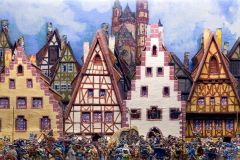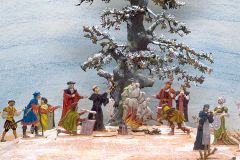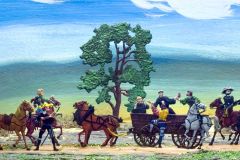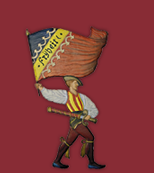
Showcases referring to the reformation
Martin Luther's arrival at Worms on 16 April 1521 (Diorama 2)
Summoned by emperor Karl V. to an interrogation at the Imperial Diet to renounce his teachings Martin Luther is welcomed by the people of Worms with enthusiasm.
 Martin Luther, a former member of the Augustinian monastery of Wittenberg, published the famous 95 arguments rejecting the papal letters of indulgence (päpstliche Ablassbriefe) and penance in 1517. His burning of the papal bull of excommunication in 1520 caused emperor Karl V. to summon Luther to the Imperial Diet (Reichstag) at Worms, where Luther was expected to renounce his arguments. At his arrival at Worms the Reformator was welcomed by the people with enthusiasm. Knights, citizens and the common people were unanimous with Luther in the conviction: “The words of the Bible shall be left as they are written” and “the Empire will remain ours”.
Martin Luther, a former member of the Augustinian monastery of Wittenberg, published the famous 95 arguments rejecting the papal letters of indulgence (päpstliche Ablassbriefe) and penance in 1517. His burning of the papal bull of excommunication in 1520 caused emperor Karl V. to summon Luther to the Imperial Diet (Reichstag) at Worms, where Luther was expected to renounce his arguments. At his arrival at Worms the Reformator was welcomed by the people with enthusiasm. Knights, citizens and the common people were unanimous with Luther in the conviction: “The words of the Bible shall be left as they are written” and “the Empire will remain ours”.
After Luther´s refusal to renounce emperor Karl V. declared imperial expel (Reichsacht) over Luther and his supporters – a manifestation that the authorities were determined to reject the new doctrine henceforth.
Dr. Martin Luther's public burning of the papal bull of excommunication on the outskirts of Wittenberg 1520 (Diorama 14)
 In October 1520 Dr. Martin Luther received a papal bull in which pope Leo threatened Luther with excommunication if Luther would refuse to renounce his arguments. While Luther wrote a declaration to defend his teachings, the rebellious knight Ulrich von Hutten published the papal bull and thus incited the public uproar in Germany against the Vatican.
In October 1520 Dr. Martin Luther received a papal bull in which pope Leo threatened Luther with excommunication if Luther would refuse to renounce his arguments. While Luther wrote a declaration to defend his teachings, the rebellious knight Ulrich von Hutten published the papal bull and thus incited the public uproar in Germany against the Vatican.On 10.12.1520, the day after the deadline, Luther burned the papal bull together with volumes of canonical laws in the presence of an excited crowd. On 3.1.1521 pope Leo declared ban over Luther.
The assault on Martin Luther after his interrogation at the Imperial Diet of Worms 1521 (Diorama 15)
 Although Luther had refused to renounce his teachings at the Imperial Diet of Worms in presence of emperor Karl V. the emperor stood to his promise and allowed Luther to leave under imperial escort.
Although Luther had refused to renounce his teachings at the Imperial Diet of Worms in presence of emperor Karl V. the emperor stood to his promise and allowed Luther to leave under imperial escort.On 4 May 1521 Luther was kidnapped on his return by knights who brought him to Wartburg castle – a maneuver of his patron, duke Frederic the Wise of Saxony, to protect the outlawed monk. Luthers “arrest” in the castle was a chance for several years of undisturbed work which resulted in his translation of the New Testament into German – while Germany was stirred up by the peasants´ upheaval.


